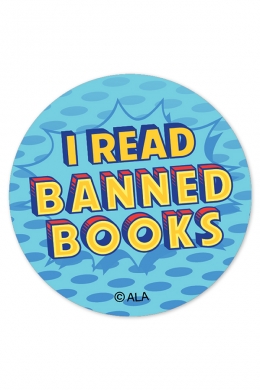Librarians love Banned Books Week, which this year took place Oct. 5-11. I left my position as an academic librarian to freelance full time, but once a librarian, always a librarian. And we librarians love a subversive book display. I worked in a high school library while getting my masters in library information science, and book displays were my favorite way to passively direct students’ attention to an important topic. I eagerly showcased banned books from our collection and watched students tentatively inch toward them.

“If they are banned, can we read them?” they asked.
“Yes, absolutely, you must,” I said.
Unfortunately, exposing young people, the adults in their lives, and the general public to books that have been challenged or censored is a privilege not all librarians share. As writers, we hold a level of communication skill and influence that lends support to librarians and readers who are limited by attempted censorship.
Banned Books Week might be over for this year. But just as ASJA provides ongoing financial support for Banned Books Week and Unite Against Book Bans, there are things that ASJA members can do year-round to support freedom of speech and access to books.
Book Censorship Facts
According to the American Library Association’s Office for Intellectual Freedom, 2,452 book titles were challenged in 2024. In recent years, the number of challenged books has exploded because of organized efforts by pressure groups and government entities, including elected officials, board members, and administrators. These groups are responsible for 72% of attempted book censorship in libraries.
The number of book challenges may in fact be underreported, according to ALA. It’s because of the risks librarians face, pressure to exclude or restrict access to certain items, and legislative restrictions on categories of books that can be acquired, particularly books on race and representing LGBTQIA+ identities.
Writers are well-positioned to fight censorship because we have the platforms and are practiced at communicating complex topics to a broad audience. Writers are directly impacted by threats to free speech, but with librarians and educators, we form a powerful coalition to protect intellectual freedom.
How Writers Can Fight Book Bans during Banned Books Week and Beyond
Here are some activities you can do to support banned books:
- Review the top 10 most challenged books in 2024, and buy copies for yourself and people you know. Request these books through your local libraries if they are not already available.
- Check out the 100 most frequently challenged books from 2010 to 2019. You probably already own some of them – recommend them to a friend, give them as gifts, or be caught reading them in public. We can be part of a movement to make these covers and titles recognizable and normalize rejecting censorship in our communities.
- Write reviews of challenged books. Be an unbiased voice of critique that can state the merits and deficits of a work without defaulting to partisan arguments. Share your reviews in professional outlets (if that’s your niche) or post on LinkedIn, Goodreads, or TikTok.
- Read, support, and get involved with I Love Libraries, an initiative of the American Library Association.
- Read book resumés from Unite Against Book Bans. Become familiar with the most frequently challenged books, and recommend this resource to parents and young adults who want to decide for themselves whether to read challenged books.
- Post and share graphics from ALA or Free Speech Week.
- Invest in some swag.
- Rewatch ASJA’s webinar on free speech and banned books from June 2025, First Amendment and Other Advocacy Efforts; or read the recap here.
Be as visible about your anti-censorship advocacy as possible. It sets an example for the young people in your orbit, who are the most disproportionately affected by book bans, and helps to embolden others who value free speech.
For more tips, check out this 2022 ASJA article from Pat McNees. For more censorship data, visit ALA’s Censorship by the Numbers.
Another opportunity to engage in free speech advocacy is Free Speech Week, which takes place Oct. 20-26. Check out the event website for updates and opportunities to participate.
**
Anna Lee Beyer is a freelance journalist and essayist writing about books, parenting, mental health, and chronic illness. Her writing has been published in national publications for the last 10 years. Her previous experience includes working as an academic librarian and archivist, newspaper reporter and editor, and magazine market researcher.

